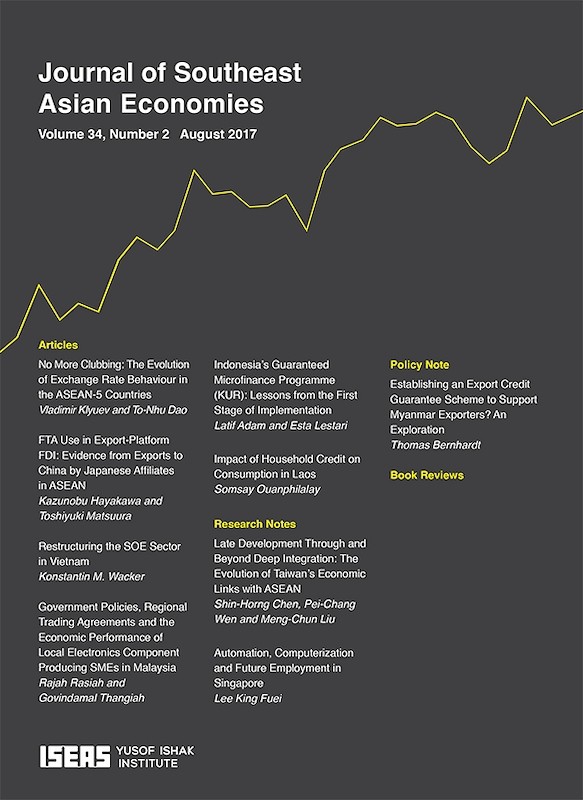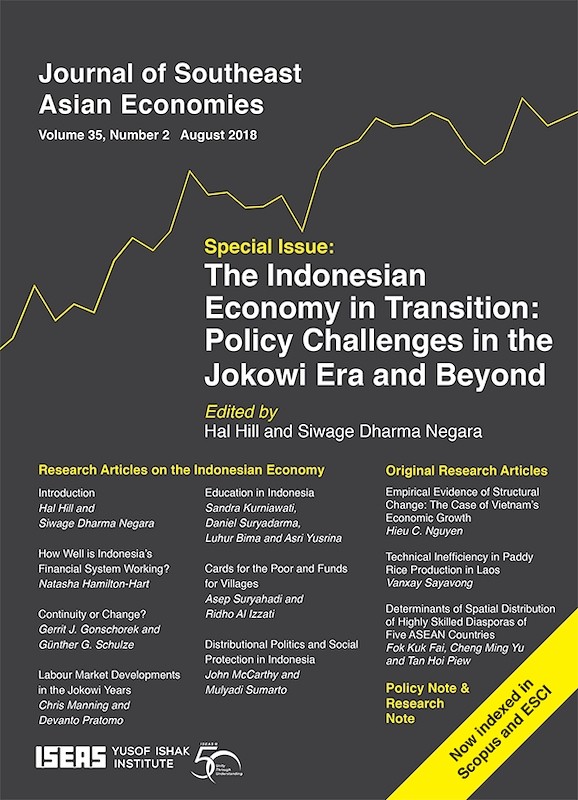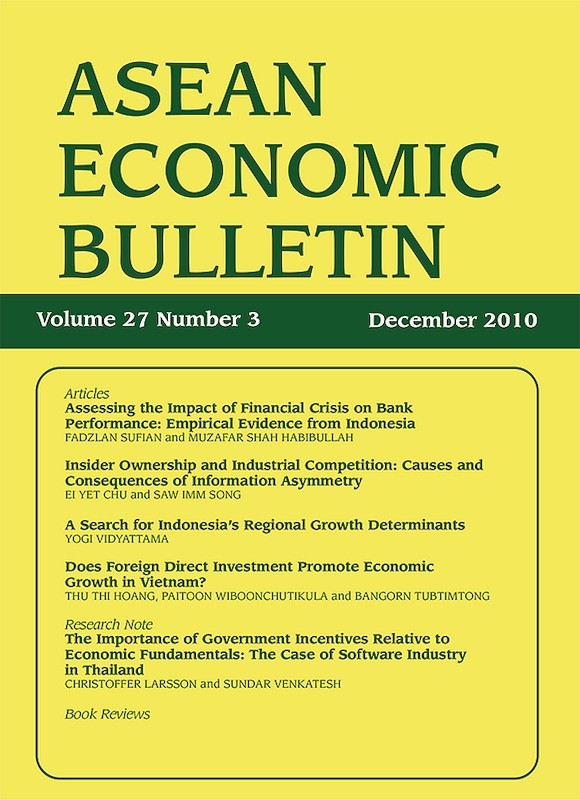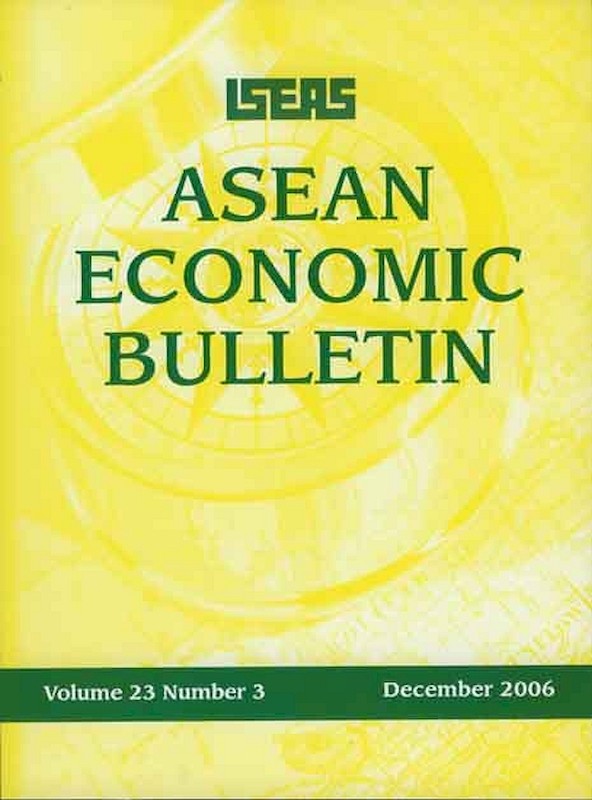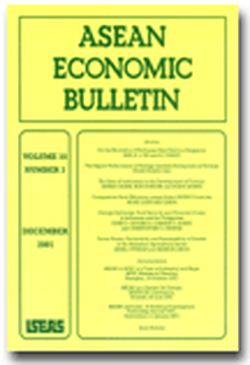Journal of Southeast Asian Economies Vol. 35/1 (Apr 2018). Special Issue Commemorating the 50th Anniversary of the ISEAS – Yusof Ishak Institute
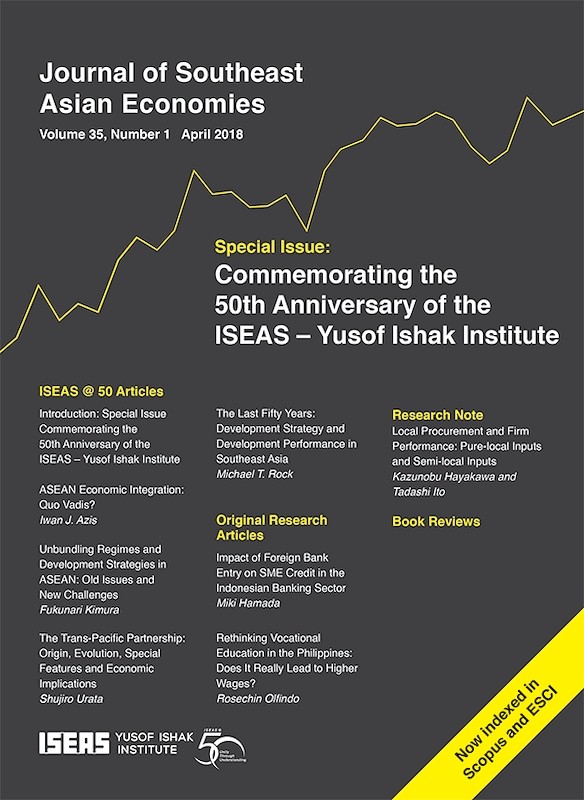
Date of publication:
April 2018
Publisher:
ISEAS – Yusof Ishak Institute
Number of pages:
120
Code:
AE35/1
Contents
-
Journal of Southeast Asian Economies Vol. 35/1 (Apr 2018). Special Issue Commemorating the 50th Anniversary of the ISEAS – Yusof Ishak Institute
[Whole Publication, ISSN: 23395206] -
Preliminary pages
- ISEAS @ 50
-
1. Introduction: Special Issue Commemorating the 50th Anniversary of the ISEAS – Yusof Ishak Institute
-
2. ASEAN Economic Integration: Quo Vadis? , by Iwan J. Azis, author see abstractOver the past five decades, the Association of Southeast Asian Nations (ASEAN) has made tremendous economic progress. While the continuous improvements in the region’s macroeconomic indicators might give the impression that this growth trend can be sustained smoothly in the long run, that might not necessarily be the case. In this paper, three imminent challenges are discussed — changing patterns of investment, slowing productivity, and the China factor. For the Association to cope with these risks and forge new development paths, structural reforms within, and deeper integration between its member states are imperative.
-
3. Unbundling Regimes and Development Strategies in ASEAN: Old Issues and New Challenges, by Fukunari Kimura, author see abstractThis paper extends the conceptual framework of “unbundling” proposed by Baldwin (2016), and tries to provide a starting point for reorganizing development strategies of ASEAN member states (AMS). While AMS have largely been successful in utilizing the mechanics of the second unbundling with a reduction in communication costs, there still exists a lot of room for exploiting its benefits. In addition, a new wave of the third unbundling, which comes with a reduction in face-to-face costs, has already arrived at ASEAN, and AMS must start incorporating it into their development strategies.
-
4. The Trans-Pacific Partnership: Origin, Evolution, Special Features and Economic Implications, by Shujiro Urata, author see abstractAfter concluding difficult and long negotiations, the Trans-Pacific Partnership (TPP) agreement was signed by twelve members in February 2016. It is an ambitious agreement that sets a new standard for global trade with a comprehensive coverage of issues and far-reaching liberalization measures. However, the ratification of the TPP in its agreed form is no longer possible because of the withdrawal of the United States. The paper argues that notwithstanding this, the TPP without the United States, or TPP-11, should be pursued by the remaining eleven members. This is because important economic benefits can be expected from its enactment. In addition, it is important to keep the momentum towards trade and investment liberalization and fight against growing protectionism.
-
5. The Last Fifty Years: Development Strategy and Development Performance in Southeast Asia, by Michael T Rock, author see abstractCirca 1960, virtually no one expected the economies of Southeast Asia to be among the fastest growing economies in the world. Yet they are. The aims here are to explain why most economic and political analysts missed the post-1965 turnaround in development performance, and to demonstrate how and why newly emerging political elites, dictators and democrats alike, constructed and sustained hegemonic centre right pro-growth coalitions that ushered in high speed shared growth.
- ORIGINAL RESEARCH ARTICLES
-
6. Impact of Foreign Bank Entry on SME Credit in the Indonesian Banking Sector, by Miki Hamada, author see abstractUsing data from ninety commercial banks in the Indonesian banking sector, this paper investigates the impact of the acquisition of domestic private banks by foreign banks on lending behaviour, particularly SME credit. Among foreign banks, we differentiate between acquired banks and greenfield foreign banks, and examine whether the acquired banks changed their lending behaviour following their acquisition. Our empirical results of effects on the credit supply of acquired banks are not clear except SME credit; between 2000 and 2009, the acquired banks did reduce credit to SMEs after acquisition.
-
7. Rethinking Vocational Education in the Philippines: Does It Really Lead to Higher Wages?, by Rosechin Olfindo, author see abstractVocational education is often seen as a means of enhancing the earning potential of disadvantaged workers — those with lower levels of general formal education, or without adequate skills to integrate into the labour market. International evidence on the effects of vocational education on earnings is mixed. An earlier study on the Philippines indicated that this type of education can increase the wages of low-educated workers. However, by using a more recent household survey and employing alternative statistical techniques, this paper finds contrasting evidence. The new estimates indicate that workers who obtained vocational education do not earn significantly more than those who did not. The differences in estimates imply that the wage effects of vocational education among Filipino workers remain unclear. Therefore, caution must be exercised while making policies that aim to promote vocational education as an alternative to general formal education.
- RESEARCH NOTE
-
Local Procurement and Firm Performance: Pure-local Inputs and Semi-local Inputs, by Kazunobu Hayakawa, Tadashi Ito, authors see abstractThis paper examines the impact of local procurement on the performance of foreign-owned firms. Using a unique survey of Japanese overseas affiliates suitable to this end, the authors show that the increase of local procurement improves Japanese affiliates’ performance, but these positive effects are observed only in the case of procuring inputs from other Japanese affiliates in their host country, not in the case of procurement from indigenous firms.
- BOOK REVIEWS
-
BOOK REVIEW: Banking and Economic Rent in Asia: Rent Effects, Financial Fragility, and Economic Development, edited by Yasushi Suzuki, Mohammad Dulal Miah, Manjula K. Wanniarachchige and S.M. Sohrab Uddin. , by Eric H.Y. Koh, author
-
BOOK REVIEW: Handbook of Empirical Resarch on Islam and Economic Life, edited by M. Kabir Hassan. , by Maszlee Malik, author
-
BOOK REVIEW: Higher Education in the Asian Century: The European Legacy and the Future of Transnational Education in the ASEAN Region, edited by Christopher Hill and Rozilini M. Fernandez-Chung. , by Chang-Da Wan, author
-
BOOK REVIEW: Singapore: Unlikely Power, by John Curtis Perry. , by Jason Salim, author
-
Thank You Note to Reviewers

